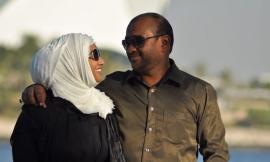
"Among His signs is this: that He created for you mates (Zawj) from your own selves that you may dwell in tranquility with them, and he has put affection and mercy between your hearts..." (Qur’an 30:21)
This quotation sums up ideal marital relationships as envisioned in the Qur’an and the harmony towards which believers are encouraged to aspire. The Qur’an teaches universal laws and social rules, as well as ethical and moral principles for regulating human conduct and personal relationships. These injunctions are addressed to both men and women, along with the admonition that if people choose not to follow their divine guidance in personal and private affairs, they will fail to achieve true "felicity," or peace of mind.
The Qur’an teaches that marriage entails certain rights and obligations and that those rights and obligations do not simply end when a marriage is dissolved; in fact, some responsibilities extend beyond the dissolution of a marriage and need to be written down in specific terms. Thus, the Qur’an demands:
"... And be not loath to write down every contractual provision, be it small or great... This is more equitable in the sight of Allah, more reliable as evidence... And have witnesses whenever you trade with one another..." (Qur’an 2:282) ".... Be true to every promise for, verily (on Judgment Day) you will be called to account for every promise which you have made!" (Qur’an 17:34)
In essence, this kind of legal marriage contract is based on a foundational principle of economic equity that takes into consideration the financial realities of all parties concerned, even prior to the agreement. In fact, Qur’anic law prohibits anyone from making a financial profit from the settlement of affairs at the dissolution of marriage. Thus, simply because one was married does not automatically entitle him or her to the ex-spouse's personal inheritance or investments. "Neither the husband nor the wife acquires any 'right' in the other’s property by reason of marriage, according to the almost unanimous opinion of the jurists." (Ati, 1977)
Qur'anic teachings were designed to ensure the maximum welfare of all family members, so they do not create impossible situations by ignoring the human realities of conflict and divorce. Rather, the Qur'an holds certain principles as inviolable and makes provisions for people to adjust to new situations without compromising either justice or equity. It recognizes the fact that if a husband and wife cannot live happily together in peace and harmony, ultimately they will have to divorce, as the following citations show:
"...either hold together on equitable terms, or separate with kindness." (Qur’an 2:229) and; "If they disagree and must part, Allah will provide abundance for all from His all-reaching bounty." (Qur’an 4:130)
Men are specifically asked to be financially responsible for women, even after divorce, provided they can afford it. And while women have been granted the right to financial support, men also have the right to maintain contact with their children without any undue stress or disruption.
"Let the man of means spend according to his means, and the individual whose resources are restricted, let him spend according to what Allah has given him. Allah puts no burden on any person beyond what He has given him." (Qur’an 65:7)
"... No human being shall be burdened with more than he is well able to bear: neither shall a mother be made to suffer because of her child, nor [a] father because of his child. And the same duty rests upon the [father's] heir." (Qur’an 2:23)
It is often difficult, however, for people in the throes of intense emotional conflict to come to agreement on "equitable terms" or to "separate with kindness," so the Qur’an specifically reminds couples in dispute not to transgress the bounds that Allah has prescribed and which have been legally and properly negotiated in their marriage contract:
"... So do not transgress them; if any do transgress the limits ordained by Allah, such persons wrong (themselves as well as others)." (Qur’an 2:229)
The Qur'anic marriage contract is a simple one in which two adults of sound mind and body agree to include what they consider important and to answer questions such as: How much will the man give to his future wife as a gift, or "mahr"? Who will pay the bills during marriage? Who will pay for the children’s financial needs after divorce? How will the inheritance of both parties be safeguarded? How will the assets accumulated during marriage be shared when the marriage ends?
All these issues are factored into different hypothetical aspects and situations of divorce in order to guide the Muslim "Ummah" (universal community) toward decisions that will affect both married couples and any children they may have.
During the centuries of Muslim decline (1250-1900), "women gradually gave up their rights [in] the Qur’an, the Sunnah of the Prophet Muhammad and the early Muslim jurists who interpreted these two ... sources of Islamic knowledge ... Though the marriage was meant to be a contract between [the] two persons involved, it was during this period of decline, a decline not only of women’s rights, but of political, social, and economic features as well, that parents and guardians became the determiners and makers of marriage agreements." (Al-Faruqi, 1988)
Furthermore, says Al-Faruqi: "The marriage agreement not only gives women economic security, [or] Mahr (obligatory money as a gift), but also gives them the rights ... to include in the marriage contract protective stipulations for herself against polygamy and undesired divorce. Such rights were not always claimed by women, uneducated as they were and unaware of these statutes of the Shari’ah which protected them.
One of the consequences of this neglect by the women is that ... Talaq became the sole pattern of divorce by men who have been abusing it for centuries in several ways. For instance, men, instead of waiting for [the] required three month period (iddah) before the divorce becomes final, have chosen [to invoke the] triple repudiation 'I divorce you, I divorce you. I divorce you!' in a fit of male anger, irrevocably to divorce their wives." (Al-Faruqi, 1988)
Recently, I was asked to give a talk to young people on the topic of legal and ethical foundations in Muslim marriage. There were compelling reasons for choosing these two issues as my focal point: first, because of the high divorce rate in the Muslim community; and secondly, because of legal and moral issues and the relevance of the arbitration process to them.
Ask any Muslim, and he or she will tell you that marriage in Islam is a legal contract. But ask the same person to provide details of what that contract can or should include, and you'll find their answers are less than satisfactory, even at times confusing and contradictory. Not surprisingly, very few people in my audience knew about the written conditions for a Muslim marriage under Islamic Law, or Shari’ah.
Excerpted from A Mosiac of Thoughts, Wahida Valiante's recently published book.
----------------
Sr. Wahida Valiante is currently the National President and founding member of the Canadian Islamic Congress (CIC) and the Chair of Islamic History Month Canada. She is a Canadian trained social worker and therapist who specializes in couple and family therapy, family mediation, domestic violence, and post traumatic stress disorder. In 2010 and 2011, Sr. Wahida was recognized among the "500 Most Influential Muslims in the World". She is the author of A Mosiac of Thoughts.








Add new comment